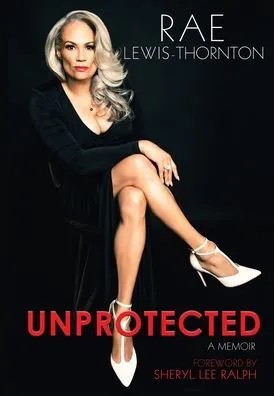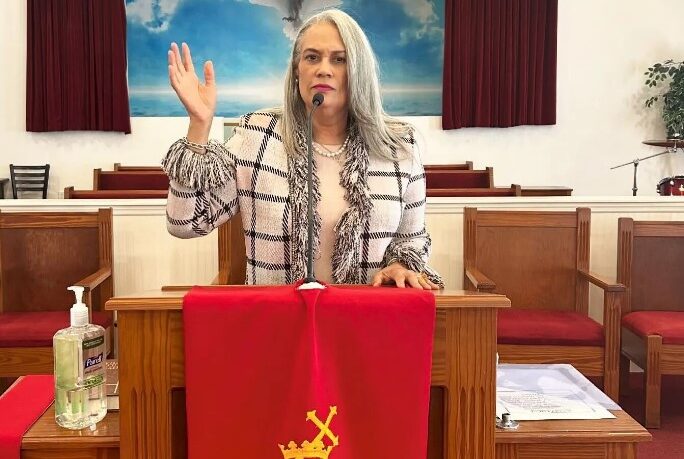“Living with AIDS is a lifelong challenge,” Rae Lewis-Thornton tells Word In Black. (Photo courtesy Word In Black)
By Rev. Dorothy S. Boulware
Word In Black
When you talk to Rae Lewis-Thornton, you discover that she’s full of faith and humor—and she’s determined to live life to the fullest.
The ordained Baptist minister, 62, does so even though she has AIDS. Her days, which she spends educating people about the disease, demand a strict regimen of survival strategies. But she’s up to the challenge.
“The life expectancy of AIDS is certainly different than when I was diagnosed in 1987. I mean, if you had lived three years, you were a long-term survivor,” Thornton says. “But living with AIDS is a lifelong challenge.”
And her life has always been about faith and purpose.
The role of faith in her journey
Thornton’s faith journey started in childhood, guided by her grandmother who took her to church. She says she was always loved by the pastors of the two churches she attended until she was on her own. Later, the support she received from her pastors and other members of the faith community helped her navigate the difficulties of her diagnosis.
“AIDS was still new, and people didn’t know what to do,” she says. “We knew about gay, white men being afflicted, but when it landed in the Black community — especially the church community — it was a real problem.”
However, Thornton says “The church has come a long way since many pronounced AIDS to be a punishment from God.”
The enduring HIV/AIDS crisis
While her personal faith community has always been present and supportive, Thornton is concerned that many people mistakenly think HIV and AIDS are a thing of the past, or at least not much of a problem. Data, however, shows exactly the opposite.
According to the latest estimates from the Centers for Disease Control and Prevention, approximately 31,800 new HIV infections occurred in the United States in 2022. Annual infections in the U.S. have been reduced by more than two-thirds since the height of the epidemic in the mid-1980s. Further, CDC estimates of annual HIV infections in the United States show hopeful signs of progress in recent years.
Although people who identify as Black and/or African American made up approximately 12 percent of the population of the United States in 2022, they accounted for 37 percent of the estimated new HIV infections — more than any other racial or ethnic group.
Thornton says people also think care and maintenance if you get HIV is minimal, as is the need for testing. Nothing could be further from the truth.
“I’m no longer on 31 pills a day,” she says. “My specific HIV regimen is eight pills, but I’ll never be able to do the one pill a day because I’ve been infected for a very long time, and I’ve developed a resistance to some of the meds because that was all we had. And compliance is incredibly important.”
 Thornton published her memoir “Unprotected” in 2022.
Thornton published her memoir “Unprotected” in 2022.
Caring for her mental health
And it’s not just the physical concerns that she deals with.
“I experience a couple days a week with some level of fatigue, which shouldn’t happen theoretically if your viral load is undetectable. But sometimes, it’s just hard to get through the day. Depression is also common with HIV,” Thornton says.
“So I take my antidepressants and see my therapist regularly. People say to me, well, you’re happy. Yes, I’m happy because I’m doing what I need to care for my mental health as well as the physical.”
She says she’s probably happier than she’s been in a very long time because she’s at peace.
A private diagnosis made public
Thornton initially kept her HIV diagnosis to herself. But in 1994, she made the transition to AIDS.
The first person she told was Rev. Jesse Jackson — then head of Rainbow/ PUSH. Thornton worked as the national youth director for Jackson’s presidential campaign in 1984 and 1988. She also told his wife, Jacqueline Jackson, who had taken Thornton under her wing as her special charge.
“They immediately prayed for me and even suggested I move back into their household, because a diagnosis back then was nothing less than a death sentence and they didn’t want me to die alone,” she says.
A mission to educate others
That same year, she became an AIDS educator, speaking at public schools across Chicagoland. She soon took her message of hope wherever she was called to go. In December of 1994, her activism landed her on the cover of Essence. The headline read: “I’m young, I’m educated, I’m drug-free, and I’m dying of AIDS.”
Two years later, “in 1996, I did a series with CBS ‘Living with AIDS’ that I won an Emmy award for,” she says.
Those same two pastors from her childhood churches found out about her status after they saw the program on their local Chicago CBS affiliate.
“The one pastor who always called me Rae Rae, called the television station. When I answered, he asked, ‘Is that my Rae Rae?’ As he had done since I was a child.”
She was likewise supported by her Chicago pastor, Rev. Clay Evans, an internationally known gospel singer, and pastor of Fellowship Chicago Church of God.
“He was loving and tender and also found out by seeing me on television. He called me to the front of the church during the service, and I was terrified because this was something he was known to do, and who knew what would come next? He asked if that had been me he had seen on television. When I said yes, he just said, we’ll have to have you talk to our young people. And that was that.”
As she wrote in her memoir “Unprotected,” published in 2022:
“I was a full member of the Christian family. I now belong to a family that wanted me. I cried tears of happiness… I was too young to fully understand what it meant to become a Christian… but if I had not found the church when I did, I don’t know how I would have made it… what I know for sure today is that God heard my cry literally and created a path for me that the light to help me maneuver through the darkness in my life.”
Her faith family has been an unexpected — but so necessary — gift to Thornton’s survival. Despite the headline of the Essence cover story, Thornton’s still alive and aging with HIV. She continues to advocate for HIV/AIDS awareness, proper testing, and comprehensive care, and she’ll never stop giving thanks to God.
“You’re going to need a God, whoever your God is,” Thornton says. “It’s imperative. You’re going to need God every step of the way.”
This article was originally published on WordInBlack.com.



